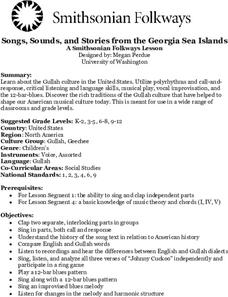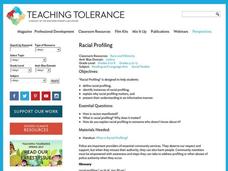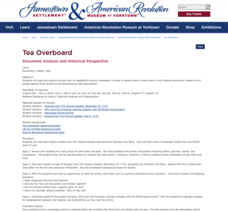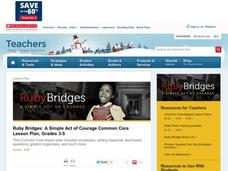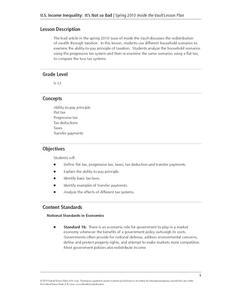Crafting Freedom
The Self-Empowerment of Harriet Jacobs
After reading Harriet Jacobs' Incidents in the Life of a Slave Girl, one of the most famous slave narratives of all time, learners imagine what it would have been like to experience the small dimensions of her hiding space. They then...
Los Angeles Unified School District
River Systems
Scholars must react to the ecosystems of a river. They use inquiry-based learning along with maps and visuals to better understand the impact of rivers on everyday life. To finish, they create final written projects and presentations.
Jamestown-Yorktown Foundation
What Was Everyday Life like in Colonial Virginia?
After reflecting on jobs people perform in the present day, scholars discuss what they believe jobs would have been like in Colonial Virginia during the American Revolution. Small groups then perform a jigsaw using informational packets....
Smithsonian Institution
Songs, Sounds and Stories from the Georgia Sea Islands
American music is the result of the influence of many cultures, including the traditions brought by the African slaves. Young scholars study the polyrhythms, the call-and-response format, and the vocal improvisations of the Gullah...
Jamestown-Yorktown Foundation
Why Did Some Colonial Virginians Seek Independence?
To understand the reasonings of those colonials who sought independence from England, young historians are divided into content groups that examine documents related to either the Boston Tea Party, the Yorktown Tea Party, Tea Overboard,...
Macmillan Education
What Do You See?
Encourage learners to develop greater self-awareness and an understanding of perception versus reality. Here you'll find a life skills lesson that includes worksheets, discussion, and brainstorming activities on the topic of how we see...
Curated OER
Popular Culture & Diversity
The topic of cultural diversity is explored with the use of pop songs and lyrics. As a way to celebrate Harmony Day, small groups read, reflect, and present their opinions on how the lyrics they analyzed have expressed a statement of...
PBS
Constitution Day
Travel back to 1787 as young scholars investigate the creation of the US Constitution. After first working in small groups to create sets of classroom rules, young scholars go on to read a summary of the Constitution and watch a short...
media.yurisnight.net
Science Lesson Plan: Our Solar System: I Wonder?
Ever wonder why Pluto isn't considered a planet? Or how large the Earth is compared to the other inner planets? Explore the universe with a series of projects that simulate different aspects of our solar system. The activities require...
Missouri Department of Elementary
Survivors
Developing a positive self-concept can sometimes be a challenge. Seventh graders engage in an activity that helps them identify their individual strengths and helps them recognize how these strengths can contribute to being a successful...
National Endowment for the Humanities
Kennewick Man: Science and Sacred Rights
"Have respect for the dead!" Scholars investigate how science and religion often clash. As they look into the laws of science and the laws of religion, the legal ramifications at the federal level of both play into an argument they...
Stanford University
Martin Luther King, Jr. and Malcolm X: A Common Solution?
Much has been made of the differences between Martin Luther King, Jr. and Malcolm X. But was there any common ground between them? Class members reconsider what they think they know about these two civil rights leaders with biographical...
University of California
Impact of the California Missions on Native Americans
While the Spanish claimed to bring civilization to California indigenous peoples, in reality, they also brought violence and forced assimilation to European values. Primary sources, such as the reports of Catholic priests and Europeans...
Teaching Tolerance
Racial Profiling
Racial Profiling. Class members chart what they know and what they want to know about this hot-button topic.
Delegation of the European Union to the United States
The Single Market and Free Trade
What are the benefits of a single EU market? Class members conclude their examination of the European Union by focusing on the single market concept designed to bring down barriers, create more jobs, and increase prosperity.
Jamestown-Yorktown Foundation
Tea Overboard
While less well known than the event in Boston, the Yorktown Tea Party was equally decisive in turning community sentiment against Great Britain. To gain an understanding of why the colonists objected to the Tea Act, young historians...
Skyscraper Museum
What is a Skyscraper?
Skyscrapers are amazing feats of architectural design that create the iconic skylines of the world's biggest cities. Young architects explore the defining characteristics of these monstrous towers with the first lesson in this four-part...
Scholastic
Ruby Bridges: A Simple Act of Courage, Grades 3-5
Through character trait graphic organizers, a vocabulary sorting activity, class discussion, and a civil rights movement slide show, your young historians will be introduced to the amazing story of Ruby Bridges and her experiences as the...
NOAA
Into the Deep
Take young scientists into the depths of the world's ocean with the second lesson of this three-part earth science series. After first drawing pictures representing how they imagine the bottom of the ocean to appear, students investigate...
Federal Reserve Bank
U.S. Income Inequality: It's Not So Bad
What is the difference between a flat tax, progressive tax, tax deduction and transfer payments? Pupils examine the ability-to-pay principle of taxation through discussion, problem solving, and a variety of worksheets on topics from US...
Federal Reserve Bank
Measuring the Great Depression
Young historians examine the cost of goods and services through the Consumer Price Index (CPI), output measured by Gross Domestic Product (GDP), and unemployment measured by the unemployment rate to gain an understanding of the economic...
Federal Reserve Bank
What Do People Say?
After reading a series of fictitious letters that represent actual events during the time period, young historians craft a small town newsletter to explain the causes of the Great Depression.
Macmillan Education
Time Management
The benefits of good time management and the consequences for poor time management are the focus of a series of exercises designed for ELL/ELD classes but appropriate for all learners.
Macmillan Education
Communication
Especially tricky for language is understanding the line between inappropriate, confrontational, (in)effective, (un)reasonable and diplomatic English. The activities in the resource permit class members to practice communicating using...
Other popular searches
- Esl Social Studies Lessons
- Social Studies Lessons Rome
- Social Studies Lessons Japan
- Social Studies Lessons on Maps





